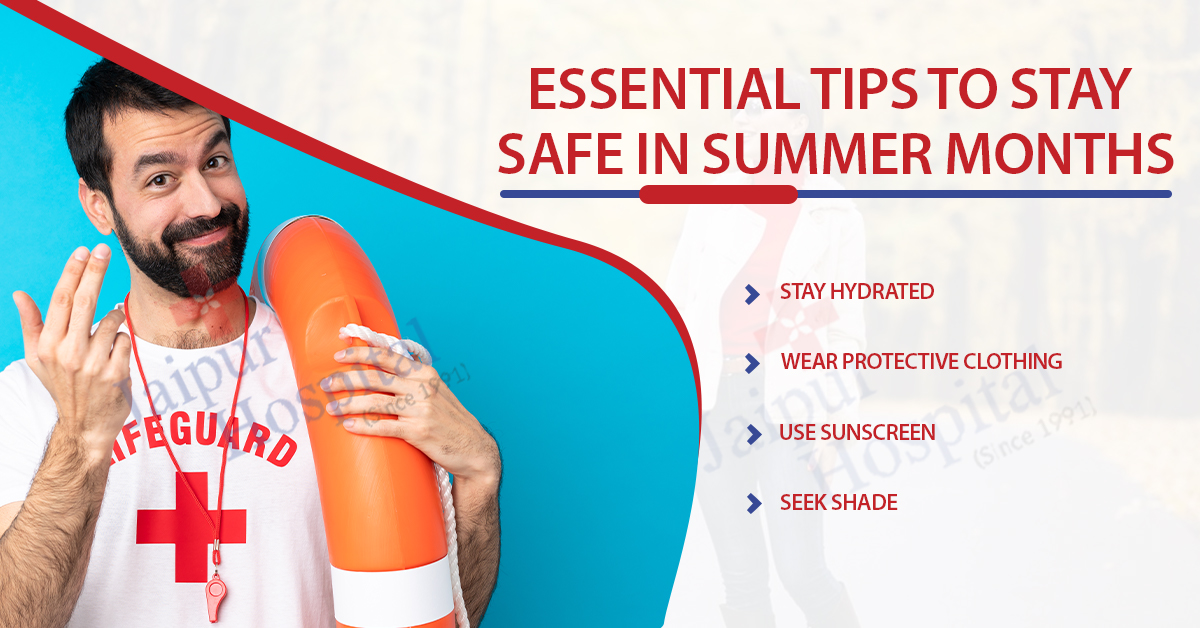Staying safe during the summer months is essential as the warm weather brings with it a host of potential hazards. With increased outdoor activities and higher temperatures, taking precautions to protect yourself and your loved ones from heat-related illnesses, sunburn, dehydration, and other summer-specific risks is crucial. Simple steps like staying hydrated, wearing sunscreen, seeking shade, and being mindful of outdoor safety can help ensure a fun and safe summer season. By staying informed and prepared, you can enjoy all summer delights while minimizing health risks and hazards.
Tips to Stay Safe in Summer
Here are some essential tips to stay safe in the summer months.
Stay Hydrated
- Explanation: The human body is composed of about 60% water, and it relies on adequate hydration to maintain essential functions. During hot weather, the body loses more water through sweat to regulate temperature. Dehydration can lead to heat exhaustion or heat stroke, which can be life-threatening.
- Tips: Drink plenty of fluids, even if you don’t feel thirsty. Water is best, but sports drinks can help replenish electrolytes lost through sweating. Avoid alcohol and caffeine, as they can contribute to dehydration.
Use Sunscreen
- Explanation: Ultraviolet (UV) rays from the sun can damage the skin in as little as 15 minutes, leading to sunburn, premature aging, and increasing the risk of skin cancer. Sunscreen acts as a barrier, protecting the skin from harmful UV radiation.
- Tips: Use a broad-spectrum sunscreen with an SPF of at least 30. Apply it generously 15 minutes before going outside and reapply every two hours, or more often if swimming or sweating.
Wear Protective Clothing
- Explanation: Clothing can provide a physical barrier against UV rays. Light-colored, loose-fitting clothing helps keep you cool by reflecting sunlight and allowing air circulation.
- Tips: Wear long sleeves, pants, a wide-brimmed hat, and sunglasses with UV protection. Look for clothing with an ultraviolet protection factor (UPF) rating.
Seek Shade
- Explanation: Staying in the shade reduces exposure to direct sunlight, lowering the risk of sunburn and heat-related illnesses. UV rays are strongest between 10 a.m. and 4 p.m.
- Tips: Plan outdoor activities for the early morning or late afternoon. Use umbrellas, canopies, or trees to provide shade when outdoors.
Be Mindful of Heat-Related Illnesses
- Explanation: Prolonged exposure to high temperatures can overwhelm the body’s ability to cool itself, leading to heat exhaustion or heat stroke. Symptoms include heavy sweating, weakness, dizziness, nausea, and confusion.
- Tips: Take regular breaks in a cool, shaded area. Wear lightweight, breathable clothing. Know the signs of heat-related illnesses and act quickly if symptoms appear by moving to a cooler place, drinking water, and seeking medical attention.
Limit Strenuous Activities
- Explanation: Physical exertion increases body temperature, which can be dangerous in hot weather. The body has to work harder to cool itself down, increasing the risk of heat-related illnesses.
- Tips: Schedule strenuous activities for cooler parts of the day, such as early morning or late evening. Take frequent breaks and pace yourself.
Protect Against Insect Bites
- Explanation: Summer is peak season for many insects, including mosquitoes and ticks, which can carry diseases like West Nile virus and Lyme disease.
- Tips: Use insect repellent containing DEET, picaridin, or oil of lemon eucalyptus. Wear long sleeves and pants, and avoid areas with standing water where mosquitoes breed. Check for ticks after spending time in grassy or wooded areas.
Knowing CPR
- Explanation: Cardiopulmonary resuscitation (CPR) can maintain blood flow to the brain and heart in emergencies like cardiac arrest. Performing CPR immediately can double or triple a person’s chances of survival until professional medical help arrives.
- Tips: Take a certified CPR class from an organization that teaches them. Practice regularly to keep your skills sharp.
First Aid Skills
- Explanation: First aid knowledge allows you to address common injuries and emergencies, such as cuts, burns, fractures, and allergic reactions, reducing the severity of injuries and preventing complications.
- Tips: Learn basic first aid techniques, including how to stop bleeding, treat burns, and manage sprains. Keep a well-stocked first-aid kit at home and in your car.
Have an Emergency Plan
- Explanation: Being prepared for emergencies reduces panic and ensures that everyone knows what to do in case of disasters like fires, floods, or power outages. A clear plan can save lives and reduce injuries.
- Tips: Develop an emergency plan with your family, including evacuation routes and meeting points. Practice the plan regularly.
Also Read: 8 Summer Safety Tips for Kids
Create an Emergency Kit
- Explanation: An emergency kit provides essential supplies needed during a disaster, ensuring you have access to food, water, medical supplies, and communication tools when regular services are disrupted.
- Tips: Include items like non-perishable food, water, a first-aid kit, a flashlight, batteries, a battery-powered radio, and any necessary medications. Update the kit regularly and tailor it to your family’s specific needs.
Let Someone Know Where You’re Going
- Explanation: Informing someone about your whereabouts and expected return time enhances your safety by ensuring someone is aware of your location. This is particularly important for outdoor activities where accidents can occur, and immediate assistance might be needed.
- Tips: Always tell a friend or family member where you’re going, your planned route, and your expected return time. Use technology, such as location-sharing apps, to keep others informed of your whereabouts.
Conclusion
Ensuring a safe and enjoyable summer requires a proactive approach to managing potential hazards associated with the season. By staying hydrated, using sunscreen, wearing protective clothing, seeking shade, being mindful of heat-related illnesses, practicing water safety, and learning CPR and first aid, you can significantly reduce the risks posed by summer activities.
Additionally, having an emergency plan and sharing your whereabouts contribute to your overall safety. Jaipur Hospital, with its extensive medical expertise and commitment to public health, emphasizes the importance of these essential summer safety tips. By following the above tips, you can enjoy the summer months while protecting your health and well-being.


